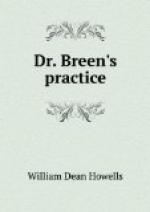“It would be useless to talk to me about—loving.” She took the word on her lips with a certain effect of adopting it for convenience’ sake in her vocabulary. “All that was ended for me long ago,—ten years ago. And my whole life since then has been shaped to do without it. I will tell you my story if you like. Perhaps it’s your due. I wish to be just. You may have a right to know.”
“No, I haven’t. But.—perhaps I ought to say that Mrs. Maynard told me something.”
“Well, I am glad of that, though she had no right to do it. Then you can understand.”
“Oh, yes, I can understand. I don’t pretend that I had any reason in it.”
He forbore again to urge any plea for himself, and once more she was obliged to interfere in his behalf. “Mr. Libby, I have never confessed that I once wronged you in a way that I’m very sorry for.”
“About Mrs. Maynard? Yes, I know. I won’t try to whitewash myself; but it didn’t occur to me how it would look. I wanted to talk with her about you.”
“You ought to have considered her, though,” she said gently.
“She ought to have considered herself,” he retorted, with his unfailing bitterness for Mrs. Maynard. “But it doesn’t matter whose fault it was. I’m sufficiently punished; for I know that it injured me with you.”
“It did at first. But now I can see that I was wrong. I wished to tell you that. It isn’t creditable to me that I thought you intended to flirt with her. If I had been better myself”—
“You!” He could not say more.
That utter faith in her was very charming. It softened her more and more; it made her wish to reason with him, and try gently to show him how impossible his hope was. “And you know,” she said, recurring to something that had gone before, “that even if I had cared for you in the way you wish, it could n’t be. You would n’t want to have people laughing and saying I had been a doctress.”
“I shouldn’t have minded. I know how much people’s talk is worth.”
“Yes,” she said, “I know you would be generous and brave about that— about anything. But what—what if I could n’t give up my career—my hopes of being useful in the way I have planned? You would n’t have liked me to go on practising medicine?”
“I thought of that,” he answered simply. “I didn’t see how it could be done. But if you saw any way, I was willing—No, that was my great trouble! I knew that it was selfish in me, and very conceited, to suppose you would give up your whole life for me; and whenever I thought of that, I determined not to ask you. But I tried not to think of that.”
“Well, don’t you see? But if I could have answered you as you wish, it wouldn’t have been anything to give up everything for you. A woman isn’t something else first, and a woman afterwards. I understand how unselfishly you meant, and indeed, indeed, I thank you. But don’t let’s talk of it any more. It couldn’t have been, and there is nothing but misery in thinking of it. Come,” she said, with a struggle for cheerfulness, “let us forget it. Let it be just as if you hadn’t spoken to me; I know you did n’t intend to do it; and let us go on as if nothing had happened.”




